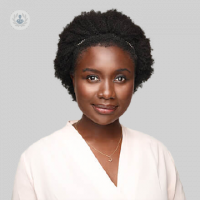Understanding adolescent acne
Written by:Leading consultant dermatologist Dr Mary Sommerlad provides a detailed look at adolescent acne in this informative article.

What is adolescent acne?
Adolescent acne, also known as teenage acne, is a common skin condition that affects adolescents during puberty. It’s characterised by the presence of:
- pimples or spots;
- blackheads;
- whiteheads, and;
- sometimes deeper cysts or nodules on the face, neck, chest, back, and shoulders.
What causes adolescent acne?
Adolescent acne is primarily caused by changes in hormone levels during puberty, which stimulate the sebaceous glands in the skin to produce more oil (sebum). This excess oil, combined with dead skin cells and bacteria on the skin's surface, can clog hair follicles and lead to the formation of acne lesions.
How can adolescent acne be treated?
Topical treatments
Over-the-counter products: Many mild cases of adolescent acne can be effectively treated with over-the-counter topical products containing ingredients such as benzoyl peroxide, salicylic acid, or retinoids. These products help to unclog pores, reduce inflammation and prevent new acne lesions from forming.
Prescription medications: In cases of more severe or persistent acne, a dermatologist may prescribe stronger topical medications, such as topical antibiotics, retinoids or combination therapies.
Oral medications
Antibiotics: Oral antibiotics, such as tetracycline, doxycycline, or minocycline, may be prescribed for moderate to severe acne to reduce inflammation and kill acne-causing bacteria.
Oral contraceptives: For female patients with hormonal acne, certain oral contraceptive pills containing oestrogen and progestin hormones can help regulate hormone levels and improve acne.
Isotretinoin (Accutane): Isotretinoin is a powerful oral medication reserved for severe, nodular acne that hasn’t responded to other treatments. It works by reducing sebum production, shrinking oil glands, and preventing acne lesions from forming.
Procedures
Extraction: In-office procedures such as comedo extraction or acne surgery may be performed by a dermatologist to remove blackheads and whiteheads manually, reducing the risk of scarring and promoting faster healing.
Chemical peels: Chemical peels containing ingredients such as glycolic acid or salicylic acid can help improve acne by exfoliating the skin, unclogging pores and reducing inflammation.
Laser or light therapy: Certain light-based therapies, such as blue light therapy or photodynamic therapy, can target acne-causing bacteria and reduce inflammation to improve acne symptoms.
What are the potential complications of untreated adolescent acne?
Scarring
Untreated or improperly managed acne lesions can lead to scarring, which may be permanent and affect a person's self-esteem and confidence.
Psychological impact
Adolescent acne can have a significant psychological impact on affected individuals, leading to feelings of embarrassment, self-consciousness and low self-esteem, especially during a vulnerable stage of life.
Hyperpigmentation
In some cases, acne lesions may heal with hyperpigmentation (darkening of the skin), particularly in individuals with darker skin tones.
Adolescent acne is a common and treatable skin condition that affects many teenagers during puberty. With appropriate treatment and management, most cases of adolescent acne can be controlled, and the risk of complications such as scarring or psychological distress can be minimised.
It’s essential for adolescents with acne to seek guidance from a dermatologist who can tailor a treatment plan to their specific needs and help them achieve clearer, healthier skin.
If a young person in your life requires expert treatment for adolescent acne, arrange a consultation with Dr Sommerlad’s via her Top Doctors profile.


